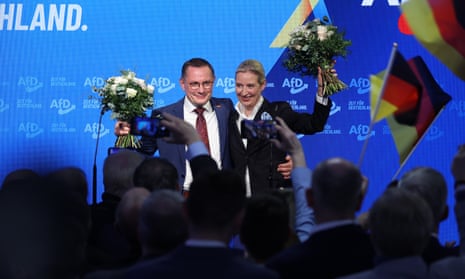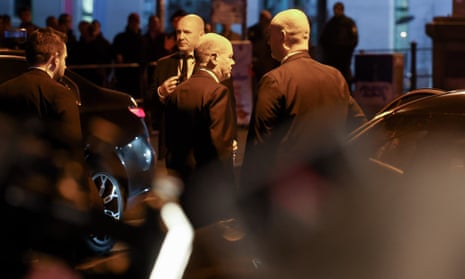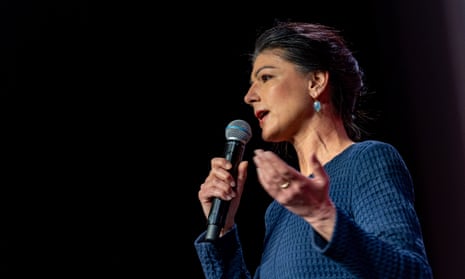
What do we know at 10pm German time
-
The conservative CDU/CSU is on course to win the German federal election and form a new government, with its leader Friedrich Merz expected to lead it in a coalition arrangement that would most likely involve the SPD and potentially the Greens as the third party, if needed.
-
Speaking as the presumed next chancellor, Merz stressed Europe’s need to be more self-reliant on defence faced with the US under Trump, as he warned the new US administration made it “clear that this government is fairly indifferent to Europe’s fate”. He also repeated his criticism of Elon Musk for his involvement in German politics and support of the far-right AfD. His comments came shortly after congratulations from Trump.

-
The far-right Alternative für Deutschland (AfD) party celebrated its highest-ever result in a federal poll, with its co-leader Alice Weidel criticising the CDU/CSU for refusing to work with her party. She predicted an “unstable government which will not last the next four years”, saying the AfD would be waiting in the wings to take over the helm.

-
The Social Democratic party has been left reeling on the back of a historically low vote share, with outgoing chancellor, Olaf Scholz, admitting it was a “bitter result”.He said he would not be involved in any coalition talks with the CDU/CSU, with other SPD leaders expected to lead.

-
With the liberal FDP more likely than not to miss out on seats in the next Bundestag, the focus is now on the Sahra Wagenknecht Alliance which is on 4.9% and 5% in exit polls. Crossing the 5% threshold would get in seats in the new parliament, and effectively force the CDU/CSU into a three-way coalition with the SPD and the Greens.

Key events Show key events only Please turn on JavaScript to use this feature
The Greens’ candidate for chancellor, vice chancellor Robert Habeck, has said that Merz would do well to moderate his tone after a hard-fought campaign. Merz has repeatedly criticised Habeck as a “failed” economy minister and said he will break up Habeck’s joint portfolio of economy and climate action in his cabinet.
“We have seen the centre is weakened overall, and everyone should look at themselves and ask whether they didn’t contribute to that,” said Habeck. “Now he [Merz] must see that he acts like a chancellor.”
While the Greens coalition partner, the SPD, has lost heavily in these elections (down about 10 percentage points) and the FDP looks set to disappear from parliament, the Greens have lost only about 3 percentage points.
In its latest projection the broadcaster ZDF has put the far-left Sahra Wagenknecht Alliance (BSW) on 5% – just enough to get it into parliament.
That will in turn affect how many seats other parties get and whether Friedrich Merz will have to turn to a third party – realistically the Greens, with whom the CDU and CSU disagree on many subjects – in order to form a coalition.
The liberal FDP, which brought down Olaf Scholz’s coalition last year, is on 4.4% according to ZDF, not enough to get into parliament.


Ashifa Kassam
For more than 150 years, the symbolism of the Siegessäule, or Victory Column, in Berlin’s Tiergarten, has shifted alongside German identity: from emblem of the empire to strategic relocation by the Nazis and, finally, its adoption as an icon of Berlin’s legendary love parade.
On Sunday, as throngs of people gathered in its shadow, the golden statue bore witness to yet another shift – an election that had yielded an emboldened far right in a result that was unprecedented in Germany’s postwar history.
“I’m devastated,” said David, 32. “And I’m scared and sad.”
Preliminary results suggested that although the conservative CDU/CSU bloc had won the largest share of the vote (29%), likely to be the second force in the parliament was the far-right Alternative für Deutschland (AfD), which garnered about 20% of the vote.
Polls had long predicted this result, said David, who declined to give his surname. But now the question was what exactly it meant for the millions of Germans who were either racialised, like him, or who are migrants.
Read on below:
The British prime minister, Keir Starmer, has also congratulated Friedrich Merz and the CDU/CSU on their victory. In a post on X he wrote:
I look forward to working with the new government to deepen our already strong relationship, enhance our joint security and deliver growth for both our countries.
Emmanuel Macron has offered his congratulations to Friedrich Merz and his “friendship” to Olaf Scholz, with whom he has had an at times fraught relationship. In a post on X, the French president said:
I just spoke with Friedrich Merz to congratulate him on his victory in the German elections.
I also had an exchange with Olaf Scholz to express my friendship on this evening.
We are more determined than ever to achieve great things together for France and Germany and work towards a strong and sovereign Europe. In this time of uncertainty, we are united to face the major challenges of the world and our continent.
This is Helen Livingstone taking over the blog from my colleague Maya Yang.

Kate Connolly
According to the latest update in the German election results, the conservative CDU/CSU alliance, the winner of the night, might be in need not just of the left-wing Social Democrats (SPD) to form a government, but also the Greens, if the far-left BSW grouping ends up entering parliament by getting more than the 5% minimum required.
There are some arithmetical acrobatics going on here which are quite complicated to understand, but the reason is due to the fact that the pro-business FDP (whose decision not to continue in the three-way coalition government of Olaf Scholz prompted early elections in the first place) looks highly unlikely to get into parliament. Latest poll results show the FDP to have secured just 4.4% of the vote. The BSW of Sahra Wagenknecht, a breakaway group from the far-left Die Linke, will leave pollsters in a state of tension until the last of the votes has been counted. In the last poll it was standing at 4.9%. That is just below the amount needed to enter the Bundestag. The nail biting in Berlin continues.
Die Linke, celebrating the most surprising result of the night, by the way, having secured 8.5%, were continuing to party late on Sunday evening, even as supporters of parties such as the FDP and SPD – which received its historically worst result ever) had long since packed up and gone home. Die Linke has not yet used the word schadenfreude (malicious glee) to describe how it feels towards the BSW which almost drove it into non-existence, but it’s not hard to imagine that the word has passed the lips of at least some of the party faithful this evening.
Ukrainian president Volodymyr Zelenskyy has congratulated the CDU/CSU, writing on X:
“I congratulate the CDU/CSU and @_FriedrichMerz on their victory in the Bundestag elections. A clear voice from the voters, and we see how important this is for Europe.
“We look forward to continuing our joint work with Germany to protect lives, bring real peace closer to Ukraine, and strengthen Europe.
“Europe must be able to defend itself, develop its industries, and achieve the necessary results. Europe needs shared successes, and those success will bring even greater unity to Europe.”
Although Donald Trump was quick to hail the success of conservatives in the German elections as a sort of personal triumph, Friedrich Merz, who leads the conservative CDU/CSU, told the state broadcaster that his top priority as the likely next chancellor would be to “strengthen Europe as quickly as possible so that we can be independent of the United States of America”.
“I would’ve never thought I would need to say something like this on television,” Merz said on a post-election panel of party leaders. “But after Donald Trump’s statements last week, it’s clear: this American government doesn’t care for Europe.”
Merz also criticized what he called “interference” from Elon Musk, who had promoted the AfD, “drastic and shameful – similar to what we’ve heard from Moscow in the past”.
In a statement to the Guardian, Nicolai Von Ondarza, associate fellow, Europe Programme at Chatham House, said that the German elections had seen very high turnout by international standards at 83-84% – and the highest since reunification.
“The age distribution is interesting with far more older people voting in Germany … The AfD gained in the youth vote, but the big winner there was Die Linke.
“AfD gained the most from mobilising non-voters as well as the centre-right. At the end, the AfD losses to the also populist BSW were minimal. On the other side of the spectrum, Die Linke won more voters from the centre-left and non-voters than it lost to BSW.
“One of the results showing how unhappy Germans were with what was on offer – the most popular chancellor candidate remained, until the end – one who was not running, Boris Pistorius,” Ondarza said.

Jakub Krupa
And that’s all from me, Jakub Krupa in Berlin, for now as I’m handing the blog over to Maya Yang to lead you through the late evening as we get more results and reactions to the German vote.
Stay with us for all the latest.
What do we know at 10pm German time
-
The conservative CDU/CSU is on course to win the German federal election and form a new government, with its leader Friedrich Merz expected to lead it in a coalition arrangement that would most likely involve the SPD and potentially the Greens as the third party, if needed.
-
Speaking as the presumed next chancellor, Merz stressed Europe’s need to be more self-reliant on defence faced with the US under Trump, as he warned the new US administration made it “clear that this government is fairly indifferent to Europe’s fate”. He also repeated his criticism of Elon Musk for his involvement in German politics and support of the far-right AfD. His comments came shortly after congratulations from Trump.

-
The far-right Alternative für Deutschland (AfD) party celebrated its highest-ever result in a federal poll, with its co-leader Alice Weidel criticising the CDU/CSU for refusing to work with her party. She predicted an “unstable government which will not last the next four years”, saying the AfD would be waiting in the wings to take over the helm.

-
The Social Democratic party has been left reeling on the back of a historically low vote share, with outgoing chancellor, Olaf Scholz, admitting it was a “bitter result”.He said he would not be involved in any coalition talks with the CDU/CSU, with other SPD leaders expected to lead.

-
With the liberal FDP more likely than not to miss out on seats in the next Bundestag, the focus is now on the Sahra Wagenknecht Alliance which is on 4.9% and 5% in exit polls. Crossing the 5% threshold would get in seats in the new parliament, and effectively force the CDU/CSU into a three-way coalition with the SPD and the Greens.

Greens still could be kingmakers in next government – snap analysis

Ajit Niranjan
Environment correspondent

For an election in which climate breakdown has long since faded into the background, the Greens are glad to have lost fewer voters than their coalition partners.
Tonight’s polls suggest the young voters who helped it into power four years ago have turned away in large numbers – with the Left and AfD enjoying a surge in support among young people – but overall the Greens have suffered only a small drop in support that has brought them to 12%.
Still, the complex maths of the German electoral system means the Greens could still play a decisive role in forming the next government. Two small parties, the FDP and BSW, are hovering at or just below the 5% hurdle needed to enter parliament – and a likely “grand coalition” between the centre-left and centre-right would fall short of a majority if either of the small parties were to clear the bar.
That’s where the Greens could step in as kingmakers – if the conservatives are willing to work with them. Heavyweights of the CDU/CSU have stressed their reluctance to do so at several points tonight, though perhaps their biggest critic, CSU leader Markus Söder, declined to categorically rule out a partnership. “If it’s at all possible, we’ll stick to our position.”

Jakub Krupa
Worth noting the stark contrast there between Merz’s words about the US – he also pointedly criticised Elon Musk for interfering in the German election by actively supporting the AfD – and Trump’s statement earlier.
CDU/CSU's Merz hints at Europe's need to be more self-reliant on defence faced with US under Trump

Deborah Cole
Berlin correspondent

Speaking on the same programme, Merz said Trump had made it “clear that this government is fairly indifferent to Europe’s fate” and that Germany would have to wait to see “whether we will still be able to speak about Nato in its current form” when the alliance meets for its next summit in June.
He added that he had not given up hope that Ukraine would be included in any negotiations with Russia on its future, perhaps with the “intervention of the US Congress” on Kyiv’s behalf against any attempt at exclusion by Trump.
“We need to see whether we don’t need to become more quickly independent in Europe in terms of our defence capabilities,” he added.
Lindner says he will resign if FDP is out of parliament

Kate Connolly
Berlin correspondent

Christian Lindner, head of the pro business FDP, which triggered the snap elections after meticulously planning the demise of the coalition, has just announced during the so-called elephant round of all the party leaders on television that if his party, as looks the case right now, fails to get over the 5% hurdle needed to get into parliament, he will resign.
Lindner, 46, who was finance minister in the fractious Scholz government, is the FDP’s longest-serving leader, having taken on the job in 2017. His wife is expecting their first child this spring.










 English (US)
English (US)